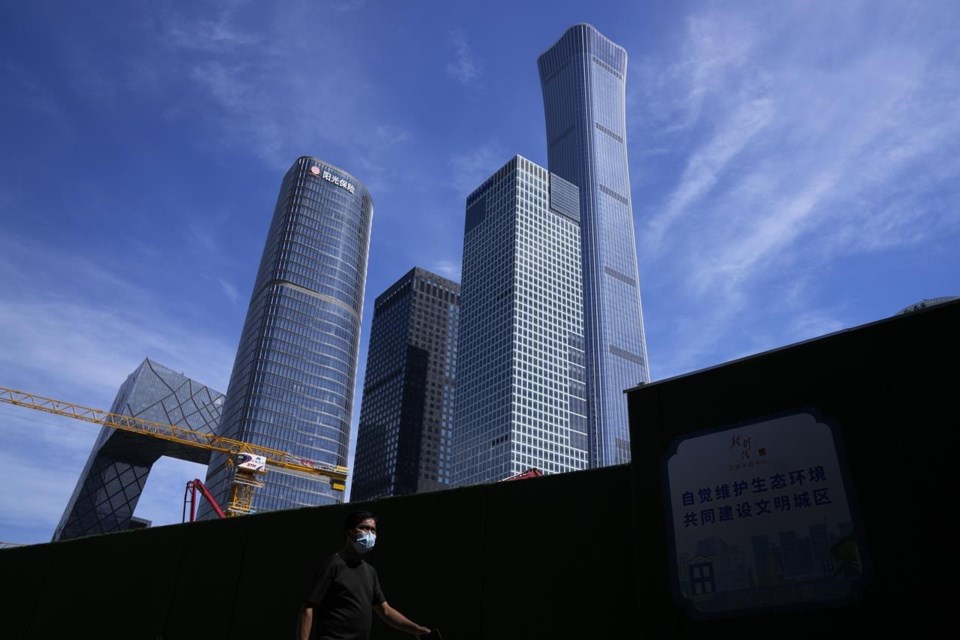NEW YORK (AP) — Stocks are opening broadly lower on Wall Street, extending the market’s losses. Losses last week broke a four-week winning streak for the S&P 500. The benchmark index was down 1.4% in the early going Monday, led by more declines in big technology companies. The tech-heavy Nasdaq was down slightly more and the Dow Jones Industrial Average was also lower. Signify Health soared after The Wall Street Journal reported that Amazon would bid for the company, while Cineworld and other major movie theater chains fell sharply after Cineworld said it was considering filing for Chapter 11 bankruptcy protection.
THIS IS A BREAKING NEWS UPDATE. AP’s earlier story follows below.
BEIJING (AP) — Global stocks and Wall Street futures declined Monday as investors looked ahead to this week’s Federal Reserve conference for signals about more possible U.S. rate hikes to cool surging inflation.
London and Frankfurt opened lower. Tokyo and Hong Kong declined. Shanghai, the only major market to advance, gained after China’s central bank nudged down a rate that affects mortgage costs. Oil prices fell more than $1.50 per barrel.
Investors are watching the annual Fed meeting in Jackson Hole, Wyoming, after minutes last week from the U.S. central bank’s July board meeting affirmed plans for rate hikes despite signs of weaker economic activity. Traders worry aggressive steps to contain inflation that is running at multi-decade highs might derail global economic growth.
“The Fed is still feeling inflation. Its actions have not even begun to dent inflationary pressures at all,” said Clifford Bennett of ACY Securities in a report. “Nor have they begun to crimp economic activity at all. The economic slowdown was already in play for other reasons.”
In early trading the FTSE 100 in London lost 0.7% to 7,494.91 and Frankfurt's DAX fell 1.1% to 13,544.52. The CAC 40 in Paris sank 1.6% to 6,389.86.
On Wall Street, the future for the benchmark S&P 500 index was off 0.6% and that for the Dow Jones Industrial Average lost 0.5%.
On Friday, the S&P 500 lost 1.3%. It ended down 1.2% for the week. The index is down 11.3% this year.
The Dow dropped 0.9% and the Nasdaq lost 2%.
In Asia, the Shanghai Composite Index rose 0.6% to 3,275.93 after the People's Bank of China lowered its Loan Prime Rate, a target for market interest rates, for a five-year loan to shore up weak housing sales.
The Nikkei 225 in Tokyo sank 0.5% to 28,794.50. The Hang Seng in Hong Kong shed 0.6% to 19,656.98.
The Kospi in South Korea gave up 1.2% to 2,462.50 and Sydney’s S&P ASX-200 fell 1% to 7,046.90.
India's Sensex opened down 1% to 59,017.57. New Zealand, Singapore and Bangkok advanced while Jakarta declined.
The Chinese central bank cut its target for a five-year loan by 0.15 percentage points to 4.3%. The rate for a one-year loan, which affects other industries, was lowered by only 0.05 percentage points to 3.65%.
The ruling Communist Party is trying to revive economic growth after crackdown on debt caused a slump in real estate sales and Shanghai and other industrial cities shut down for weeks starting in late March to fight virus outbreaks.
The move “reflects the seriousness" of the real estate slump and shows Beijing is “willing to take more forceful actions,” said David Chao of Invesco in a report.
Chinese leaders are trying to revive economic growth without using across-the-board stimulus that might push up inflation or politically sensitive housing costs.
In energy markets, benchmark U.S. crude lost $1.52 to $88.92 per barrel in electronic trading on the New York Mercantile Exchange. Brent crude, the price basis for international trading, shed $1.55 to $95.17 per barrel in London.
The dollar rose to 137.13 yen from Friday’s 136.91 yen. The euro declined to $1.0016 from $1.0034.
Joe Mcdonald, The Associated Press




